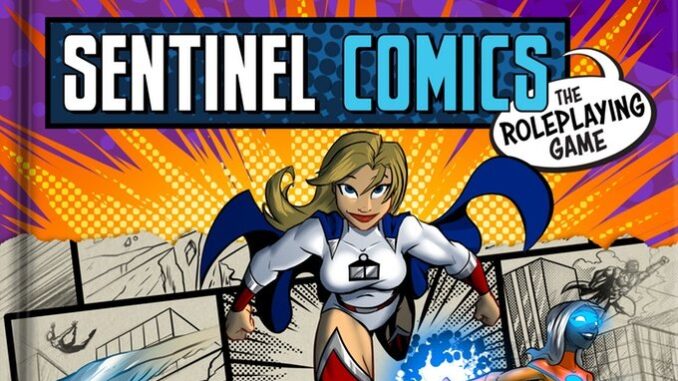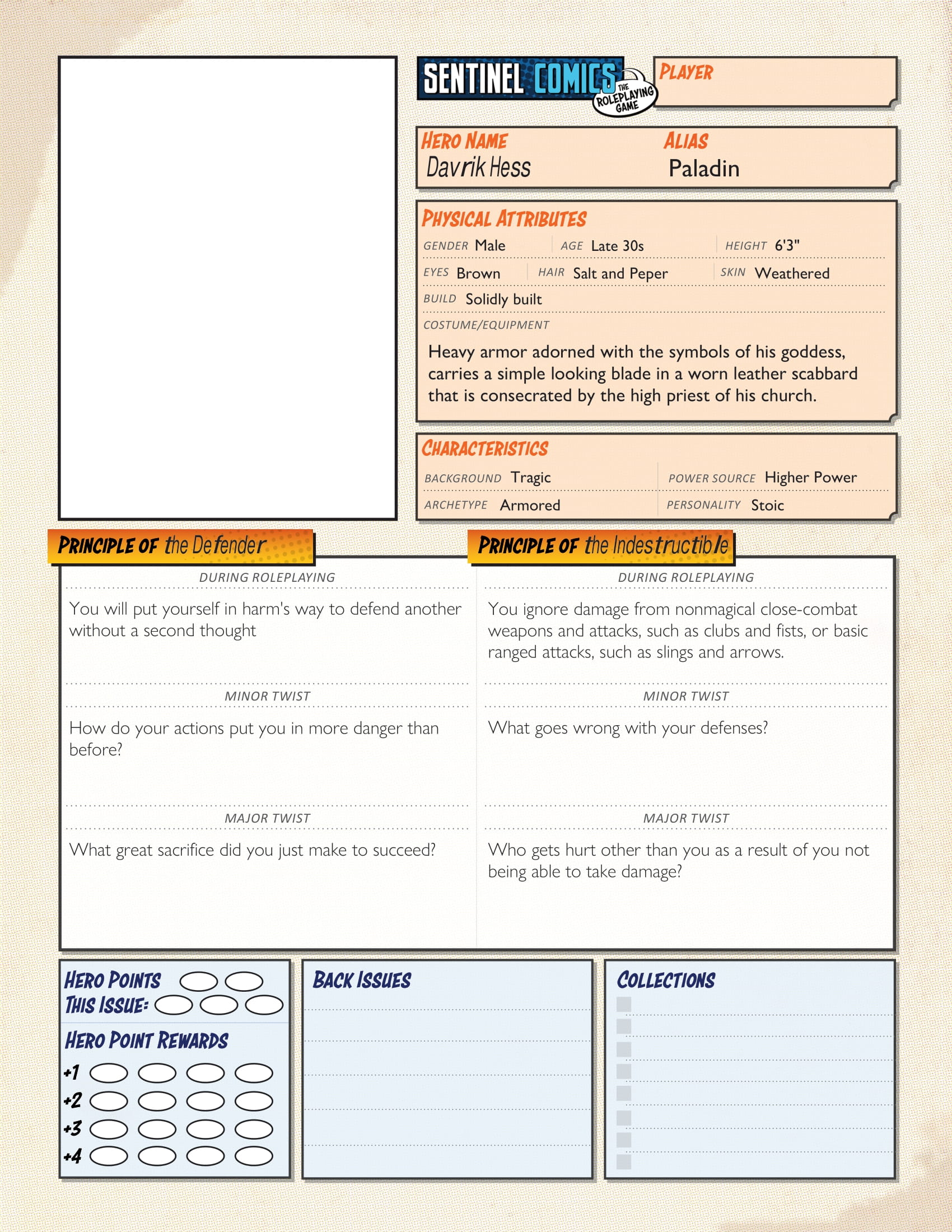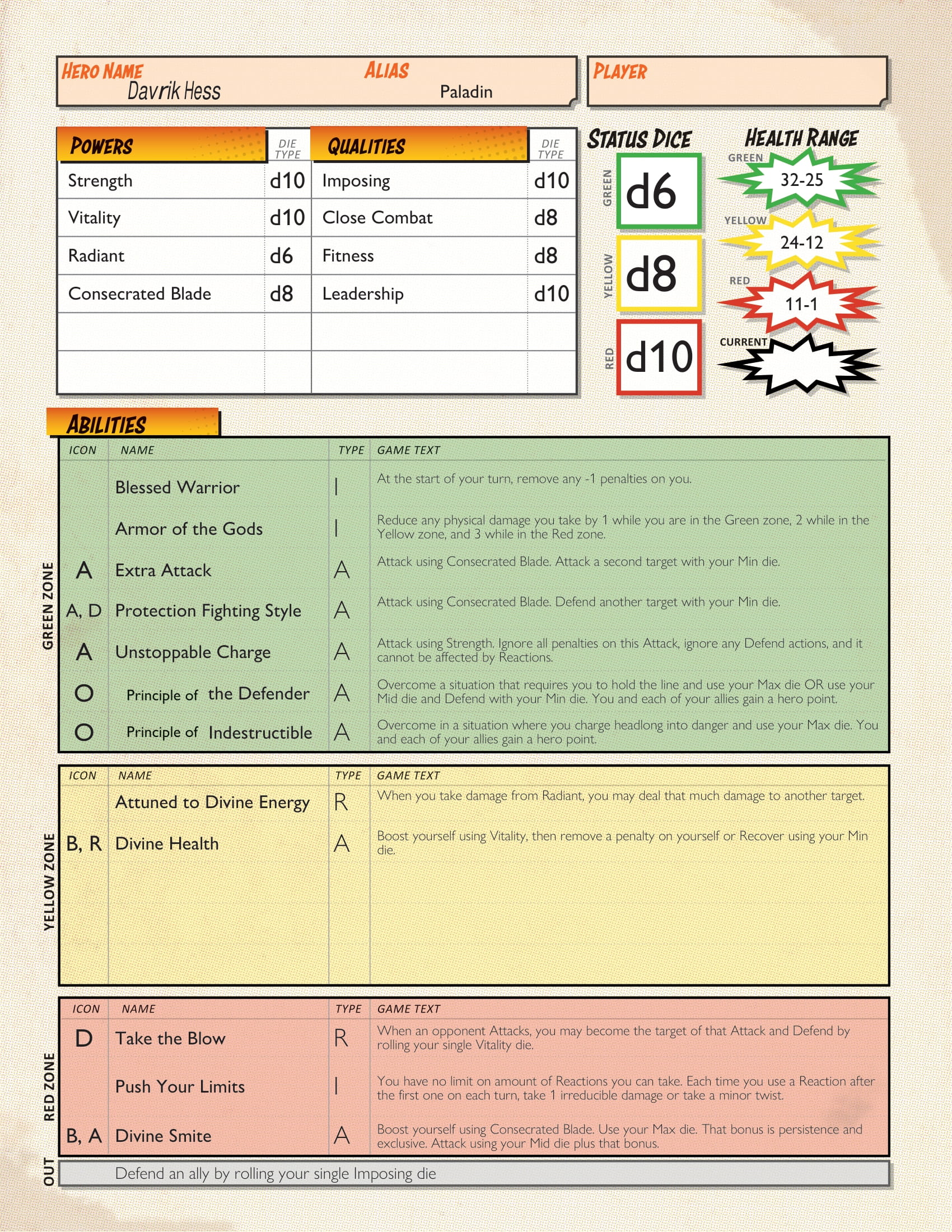
It’s no secret that I’ve become infatuated with the Sentinel Comics Roleplaying Game in the past several months. It might just be my definitive silver age superhero game and I’m thoroughly excited to see if it still captures that same feeling at the table in a street level Iron Age adventure for example.
There’s a number of reasons that I feel so in love with the game. The first was clear just from reading through the rules and reinforced by watching it in play – each and every action scene is on a timer. The GYRO (Green/Yellow/Red/Out) scene tracker puts a sense of urgency on the players. The standard scene tracker has eight spaces on it, meaning your standard action scene will last only an average of eight turns. The problems that the players are presented with need solutions and they need them fast, because when that ticking clock runs out, the scene ends regardless of whether or not your team was successful. This could have dramatic repercussions on the adventure and the entire campaign.
One of the other reasons that I really fell in love with the game wasn’t readily apparent until I actually got to run a couple of scenes – while you are rolling multiple dice, you are (generally) only getting to use one of those dice as your result. And that die is (again, generally) the middle of the pack. If you want to get a full success to Overcome a challenge without any complications, you need at least an 8 as that middle die result. That’s no mean feat. And so amplifying your teammates power is something that is as dramatically important as punching the bad guys, especially when the scene tracker is running out of spaces and you need to clear these challenges to end the scene. Creating bonuses for your allies and penalties for your enemies isn’t something that is usually looked on favorably by a lot of players who want to actively do something with their turn. This system turns that philosophy on it’s head – when the players start coordinating and acting like a team, they start to make things happen.
And to that end – there are precious few ways for you to completely fail your action so that you are not likely to “waste” a turn. There are no “attack rolls” in this game. You simply punch the villain – you may just not punch them quite as hard as you anticipated. The only way to completely fail an Overcome or provide no Boost or Hindrance is to roll less than a 0 (possible if the enemy has done it’s job of stacking penalties on you) – but getting what you want might end up costing you more (sometimes much more) than you anticipated.
And this got me thinking – what other kinds of games could do with this kind of ruleset? High fantasy was the first thing that leapt to my mind. Any number of climactic battles in D&D could stand to use a timer to heighten the dramatic tension – but the way the math works, the possibility of a wasted turn from a missed attack roll is very present. Likewise, while there are ways for a DM to reward good teamwork, each player is very much focused on doing “their thing” in a battle. And that works – most of the time.
So – could Sentinel Comics Roleplaying be used to play in a fantasy game?
I say yes – after all, what are high fantasy heroes if not reskinned superheroes anyway? Some things would need to be changed and rewritten for a fantasy flair, but a lot of the existing “power sources” and “archetypes” also lend themselves quite well to fantasy archetypes as well. So before I went too far into this, I decided to take a stab at creating a couple of fantasy heroes based on some of the iconic classes using the material without any changes to see what kind of feel I could get and if this was going to be viable before putting more of my efforts into this project. And I’m pretty happy with the results I’ve gotten so far –
Davrik Hess saw his friends and family slaughtered in a night of hellfire in an attack perpetrated by a cult of diabolists when he was a young teenager. It was a miracle that he survived, but it turned out that the gods had other plans for him. He managed to crawl from the ruin of his village into the nearby desert wastes where he would have died from exposure had it not been for a passing itinerant priest who brought the boy to the closest temple. It was here after his recovery that it was revealed to him how he had survived the attack – the goddess of the dawn had protected him, investing him with a power to turn aside the common dangers of the world, and the blows that killed the rest of his kin did nothing more than knock him unconscious where he was left for dead. And he could use that power to stand against and turn back the darkness that stood ever present on the horizon, always threatening to overrun the light – or he could relinquish it to someone who would. Davrik wants no one to have to experience the trauma that he did and so he accepted the charge and trained with the priests for years in the art of war before striking out into the world to lead the charge against the darkness, clad in the protection of his goddess and carrying a consecrated sword.
So as you can see, this isn’t a perfect recreation of a Paladin from 5th Edition D&D, but the spirit is there. And with the rules being what they are, other archetypes and power sources could be chosen to get a similar style of character with a different feel – the Nature power source instead for an “Oath of the Ancients” style defender or a Blaster or Elemental Manipulator archetype to play a Paladin that focused more on spells instead of swordplay.
Now, this would fundamentally have to be a game with a different feeling than a lot of Dungeons and Dragons scenarios – gone are the sessions of crawling through a dungeon checking for traps and listening at doors (though I think something could be done with the scene tracker to represent this concept) and instead focusing on high action and adventure scenarios with big set piece battles with kingdoms and continents at stake – There’s definitely something here that’s worth exploring, so let’s see how far I can take it.


